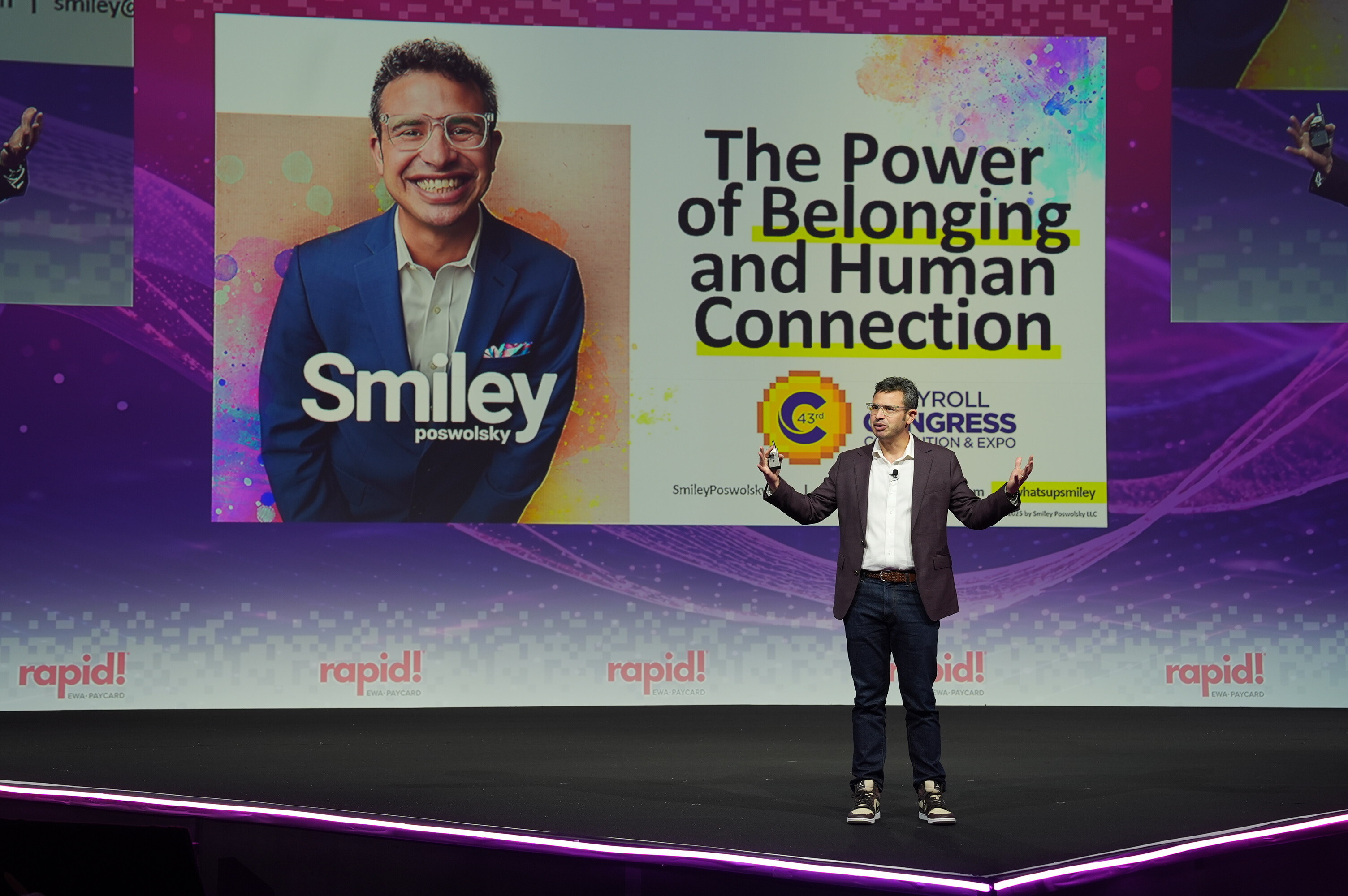
Caren Bennett
May 13, 2025
Keynote Speaker Creates Culture of Belonging for Workplace Connection

Adam "Smiley" Poswolsky delivered his presentation, “The Power of Belonging and Human Connection,” as the keynote speaker during the Opening General Session, sponsored by rapid!, at the 43rd Annual Payroll Congress in Orlando.
You may have heard the term “epidemic of loneliness” used to describe the ongoing lack of human connection in the United States. In 2023, the U.S. Surgeon General issued a groundbreaking advisory about the rise of loneliness and the profoundly damaging effects loneliness can wreak on our mental and physical health. The advisory warned that a lack of human connection can be as damaging to one’s health as smoking 15 cigarettes a day.
With scientific studies showing that one in two adults in America report experiencing loneliness, human connection is vital among family, friends, neighbors, and in the workplace now more than ever. However, with the prevalence of remote and hybrid work, the increasing interest in artificial intelligence (AI), and the constant presence of computer or cell phone screens in our daily lives, there are significant roadblocks to forming connections in the workplace. This is where Adam “Smiley” Poswolsky steps in. Poswolsky is a workplace belonging expert, thought leader, and bestselling author of four books.
Poswolsky delivered his presentation, “The Power of Belonging and Human Connection,” as the keynote speaker during the Opening General Session, sponsored by rapid!, at the 43rd Annual Payroll Congress in Orlando. Poswolsky’s own struggle with loneliness is why he wrote his book, “Friendship in the Age of Loneliness.”
“I realized, wait a second, how come everyone I know is struggling with making friends as an adult?! Why is friendship at its lowest levels in 30 years? I wanted to write a book that helped people find concrete, simple solutions to building better relationships at work and beyond,” he said.
Path to Professional Public Speaking
Poswolsky ’s desire to help people form connections led him on a near decade-long journey to becoming a professional public speaker, which he describes as the “hardest but most meaningful” thing he has ever done. When he first began public speaking, Poswolsky recalled just being happy to speak to a room of 20 people in his friend’s co-working space. Since then, Poswolsky has spoken to audiences from nearly every industry, giving over 650 keynotes in 25 countries around the world, while helping individuals and companies create cultures of human connection, team engagement, and belonging.
No matter the industry or even the country, Poswolsky has found that individuals often experience the same struggles.
“It always amazes me that for all the differences we have as people, we are often struggling with similar things: the desire to be seen at work, the need for belonging at work, wanting to feel celebrated at work,” he said. “That’s probably the coolest thing about being a keynote speaker: you experience firsthand, every single speech, that we have so much more in common than most people think.”

It’s All About Connection
To prepare for his keynote speeches, Poswolsky interviews a handful of people who will be in the room when he’s speaking. This allows him to get to know their personal stories and experiences to discover what’s working for them or what they are struggling with. For Payroll Congress, Poswolsky interviewed several payroll professionals who were present for his keynote speech.
“It gives me a better understanding of the room and what you experience every day and allows me to connect more deeply with the audience,” Poswolsky said.
It’s this connection with his audience that Poswolsky enjoys most about his career as a thought leader and keynote speaker. He gets excited to answer questions and looks forward to hearing feedback and suggestions. Poswolsky ’s genuine love and passion for people create a deep connection with his audiences. The genuine bond that is developed throughout the session brings the message he shares full circle.
“It’s one thing to speak about belonging and human connection—it’s another thing to be able to feel that in a room,” he said. “I love that feeling. I feel very grateful that I get to do what I do.
“Payroll professionals have an incredibly essential role in our workplace culture that is often underappreciated and unnoticed. I first hope to celebrate these individuals and ensure they understand how important their work is.”
The Benefits of a Well-Connected Workplace
In his keynote, Poswolsky addressed many of the challenges to forming connections in the workplace.
“We’ve entered the era of disconnection and being overwhelmed at work,” Poswolsky said. “So many employees feel disconnected from their colleagues and overwhelmed with not having the time to learn the very skills that would help them be better at their job in the first place.”
The American Psychological Association's 2024 Work in America survey suggests a correlation between loneliness and productivity, showing that 45% of workers age 18-25 report feeling lonely at work and in this same age bracket, only 46% report high levels of productivity at work.
While many factors contribute to this disconnect, Poswolsky feels that an overwhelming contributing factor is a lack of in-person interaction. While hybrid or remote work has its own benefits, it also means people are spending significantly less time with our coworkers.
“The average person spends over 7 hours a day looking at a screen. For teenagers, it’s higher,” Poswolsky said. “According to research, it takes 90 hours with someone IRL [in real life] for them to become a friend. This doesn’t mean we need to be in the office five days a week, but it does mean we have to be intentional about creating time for human connection in the office, remotely, when we’re hybrid, and everywhere in between.”
Poswolsky said that this intentionality can be as simple as getting to know a co-worker’s favorite spot for lunch, the names of their children, or if someone in their family is sick. He feels that payroll professionals are particularly well suited to this type of connection.
“Payroll professionals have a unique perspective of showing up for their people week after week, and they know that sometimes it’s the smallest things that can lead to a deeper relationship with a co-worker, customer, or client,” he said.
These small connections are greatly beneficial to the individual, and in turn, to a company.
“Highly connected teams are high-performing teams,” Poswolsky said. “Better relationships lead to more trust, higher levels of psychological safety, innovation, and performance. It starts with people feeling seen, heard, and safe to share their ideas, be vulnerable, and be themselves at work.”
Poswolsky ’s presentation provided practical tools and interactive exercises that payroll professionals can implement immediately to foster a culture of belonging and human connection in the workplace.
“I hope they left my presentation feeling empowered to build more belonging, connection, and engagement for themselves, their teams, and their colleagues at work and beyond,” he said.
Caren Bennett is the Editorial Specialist of the Editorial Division for PayrollOrg.




